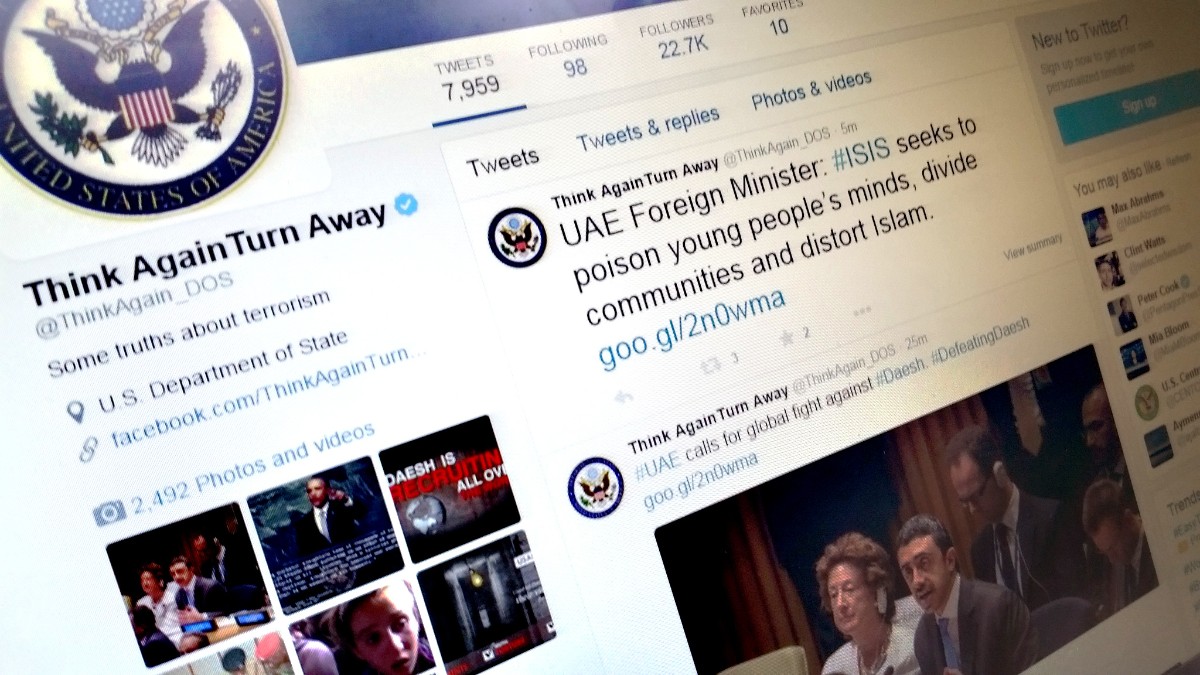
Winning the Social Media War Against ISIS
Let’s stop here. There is no war online against ISIS in which the United States can seize victory, because there is no online victory to be seized. “Winning” a war implies specific objectives that can actually be met. On the internet, there is no clear ground to be gained, and no reliable way to measure success when it comes to countering violent extremism—as many have mentioned, you can’t measure if someone decides to not join ISIS.
Despite this, the United States is engaged in a variety of online efforts to counter ISIS messaging and recruiting, to various degrees of perceived success or failure. But as with any government-run social media campaign, these efforts face a variety of challenges:
- In the world of social media, the United States has no more powerful a voice than a single person operating a twitter account. Everyone is on an equal playing field.
- The spread of misinformation online is an epidemic.
- The most effective messengers online are people’s own peers, especially as people select media sources according to their own confirmation bias.
Let’s expand a bit on these issues.
Everyone is Equal
As a government, the United States doesn’t really hold the cards on social media. It’s literally one of billions of other players. It cannot “interrupt this tweet” to bring you a special post, or command your undivided attention. There is no special air time, and quite frankly, it’s boring. The equality creates a great deal of noise, forcing users to select down to relatively few sources. On top of that, an ISIS recruiter has all the same access to social media tools as the US Government.
Misinformation Reigns Supreme
The internet already has in place a variety of safeguards against the spread of misinformation—it is, after all, the greatest information resource in history. However, these safeguards require the active effort of the user, and many don’t take the extra few seconds check what they’re reading or reposting.
This week, Facebook users in the United States saw the spread of a fast moving rumor that copying and pasting a privacy notice would somehow shield the user from terms and conditions already agreed to as part of the social networking site’s terms of use. This posting epidemic, existing in various forms since 2012, had no basis in fact, and has been routinely shown to be false and misleading—yet it still persists. A simple Google search is all that is needed to verify this. Yet users still continue to post it. Snopes can be used to verify practically every common rumor on social media, and Facebook itself often automatically links to it.
Unfortunately, the effort involved in “Googling it” goes against the notion that many internet users are fundamentally lazy. They must take the time to actively verify the truth of the information they are seeing, liking, or reposting—and nowadays it’s very easy to find information that supposedly confirms whichever side of an argument one prefers. In the world of social media, users very often build networks of those that already agree with their perceptions, and select news sources in the same fashion. This confirmation bias is an enormous problem when it comes to dispelling misinformation or changing minds. In this type of environment, ISIS has the advantage, though it certainly has no issues with demonstrating the truth of its brutality.
Social Media is Social
Social media exists primarily for its entertainment value. Sure, there may be some exceptions, and tools like Twitter are great for networking and news, but social media is primarily social. The US Government produces little information that is entertaining to audiences susceptible to ISIS propaganda. Because social media is social, it is social connections that prove most effective in persuasion. The key here is to make sure that people are not ostracized to the point of seeking comfort from an ISIS recruiter.
How we Win the Interwebs
We don’t—stop worrying so much about winning the online “war.” After all, why is anyone who is tempted to join ISIS really going to click on US Government created content? Focus on winning in the real world—enable real people to counter propaganda on their own.
It’s heartening to see that the State Department is making an effort to empower, rather than dictate to local voices. The use of ISIS defectors is undoubtedly a particularly powerful tool in discrediting the organization’s messaging. However, depending on how defectors are used, there’s a risk in discrediting their message if they’re too closely associated with U.S.-led counter-ISIS programming. Effective empowerment of local voices will involve education/training, access to resources, and networking. It will involve enabling local voices to get their word out on their own, rather than doing it for them, or spreading their message via U.S. social media accounts. It does not involve commandeering those voices for U.S. foreign policy purposes—that means publicly promoting those voices via U.S. run social media accounts may be counterproductive.
The Daily Beast recently looked into US Government efforts to enlist Hollywood in the effort to defeat the ISIS narrative. Maybe there is some hope here, but short some sort of blockbuster action movie, it’ll be difficult to get much attention. Even the most successful videos, like Kony2012, can fail at their strategic objectives.





